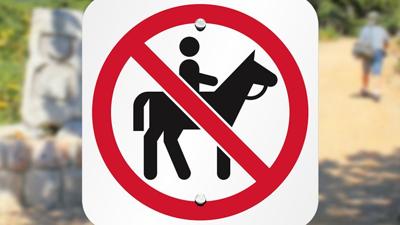It’s been decided. Horseback riding will be prohibited in most Jefferson County parks.
After months of discussion and debate, the Jefferson County Council voted 4-3 Jan. 27 to approve an amendment to the county’s parks and recreation ordinances to ban horses in all county parks except for Big River Saddle Club Park in Dittmer and, once it is developed, Beck Park in the northwest corner of the county in the Eureka area.
Big River Saddle Club, a 10-acre site, hosts horse shows at its arena and pavilion but has no riding trails.
Beck Park has been in the Parks and Recreation Department’s land bank for about 25 years and has largely been unused.
The amendment will go into effect 30 days after a notice about it has been published in a legal publication.
Those who violate the horse ban, once it takes effect, can be charged with a misdemeanor in Jefferson County Municipal Court and, if found guilty, can be sentenced for up to a year in the Jefferson County Jail and fined $1,000.
The change primarily affects the county’s Pleasant Valley Nature Preserve, 6701 Twin River Road, near Byrnes Mill Road and Hwy. PP in High Ridge.
Horseback riding had been allowed in that 38-acre site since 1998 after horse enthusiasts and the county’s Parks Commission reached an agreement to allow the animals on certain trails in the park, and after horse owners promised they would help police people who were riding on other trails deemed unsuitable for horses.
“Pleasant Valley has been a horse-friendly park since 1998,” said Barbara Davis of Fenton, one of 20 people who spoke against the proposed changes at the Jan. 27 meeting. “They even put a hitching post in for us.”
That changed in the middle of last year, when the county won a $74,500 grant from the Jefferson Foundation to construct about 1.5 miles of gravel trails in the park.
Before the work began, signs were posted prohibiting horses on the trails and horse enthusiasts have turned out in force at many County Council meetings to express their displeasure, many saying the trails are needed to provide therapeutic services to disabled people.
Before the council voted 5-2 Oct. 28 to give preliminary approval of the amendment, county counselor Wes Yates briefed the council on the reasons the amendment was needed.
Yates said when the county took title to the Pleasant Valley site in 1979 from the federal Land and Water Conservation Fund, the agreement specified what it could be used for. The agreement accepting the Jefferson Foundation grant also did the same.
“These documents expressly state that the donations are for hiking and running trails,” he said. “Do these documents expressly say that horses can’t be ridden on them? No,” he said. “But it’s my job to protect the county and advise it to live up to the letter of the law. Allowing horses on these trails does not adhere to the contracts the county signed and said it would uphold.”
Yates said that the county also could be liable if an accident involving a horse happened on county-owned property.
He said the county’s liability insurance carrier, the Missouri Public Entity Risk Management Fund, would not go so far as to say the county should ban horses.
“They said that if something goes wrong (with a horse), the county would not be free from a lawsuit,” Yates said. “What they would tell us is that if we allowed horses in our parks, they (horse groups) need to be licensed by the county and need to have at least $2 million in liability.”
Yates said individual riders are not expected to have that insurance, but businesses that have used the nature preserve should be required to.
One of the most outspoken critics of the equine amendment, Susan Davis, has operated such a business, although she has said she no longer brings horses into Pleasant Valley from her 60-acre Rocking J Ranch north of the site since she now operates a wedding venue business, RJ Catering LLC, from the ranch.
However, a nonprofit group that she founded, Hands That Help, provides horseback riding, including for people with disabilities, from the ranch. She said Hands That Help and owners of other ranches in the Saline Valley have for more than two decades brought horses through the back of Pleasant Valley through a historic schoolhouse trail.
“Any business that operates through the county is required to post proof of insurance,” Yates said, noting that a nonprofit organization is considered to be a business for that purpose under the law. “Attorneys who provide services to one of our offices must have insurance. Contractors who build bridges and roads for the county most have insurance. If someone is riding a horse on a trail, and there’s a rut and the horse trips and throws the rider off, the owner of the horse may not be liable, but the county, as the owner of the land, would be.”
Before the council was to take the second of three required affirmative votes on the ordinance, they heard a presentation by Denise Farris of Stilwell, Kan., a mediator and arbiter who formerly had a law practice that specialized in part in equine and animal health law.
Farris said she volunteered her services to look into the case after opponents of the proposed ban contacted her. She submitted a 1/2-inch-thick packet of information after her three-minute presentation to the council.
The council then voted 4-3 at its Nov. 12 meeting to table the ordinance until it could consider that additional information.
Before a vote was taken on Jan. 27, Councilman Charles Groeteke (District 4, Barnhart) attempted to have the ordinance removed from the agenda and tabled until Beck Park or another alternative site could be developed for horseback riding – without a tax increase.
The council voted 4-3 against that move, with Jim Terry (District 7, Cedar Hill) and Renee Reuter (District 2, Imperial) joining Groeteke.
Those who cast dissenting votes were Brian Haskins (District 1, High Ridge), Phil Hendrickson (District 3, Arnold), Tracey Perry (District 5, Festus) and Dan Stallman (District 6, De Soto).
The same 4-3 tally stood up for the second and final votes to approve the amendment, with no one switching sides.
Terry was the only one who voted for the ordinance Oct. 28 and against it on Jan. 27.
“I voted for it the last time because I was under the impression that the county was subject to legal liability,” he said. “I don’t believe that to be the case now. Because many District 7 horse owners were against it, I felt like I needed to vote against it.
“I would like to make a note that, despite my vote, I am concerned about a business operating in a county park without some kind of agreement with the county, but I think this could have been taken care of with a much less drastic measure than this bill.”




